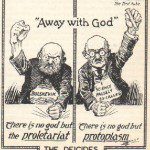I have been posting about pagan survivals into Christian times, not in terms of actual continuities so much as modern romantic reconstructions of those matters. As I noted, scholars like Margaret Murray used such a vision as the basis for a whole recreation of a supposed ancient paganism surviving in modern times in the form of the witch-cult. My colleague Beth Barr has blogged often about such modern mythologies concerning medieval times, and on witchcraft.
I use this discussion as an excuse to reproduce here a poem I like a lot, from the Scottish writer John Buchan, from his 1910 collection The Moon Endureth. Buchan had a very strange mixture of interests, and is best known for sturdy all-British heroes fighting German spies, as in The Thirty Nine Steps. He seems like the ultimate Establishment insider, who ended his days as Lord Tweedsmuir and Governor General of Canada. At the same time, he had a powerful interest in occult and esoteric matters. I have blogged about his astonishing conspiracy novel The Power-House, and his 1927 book Witch Wood used the Murray theory of pagan survivals into Christian times. Buchan was a much weirder writer than we often give him credit for.
Anyway, here is Wood Magic, with its memorable closing lines.
Wood Magic
(9th Century)
I will walk warily in the wise woods on the fringes of eventide,
For the covert is full of noises and the stir of nameless things.
I have seen in the dusk of the beeches the shapes of the lords that ride,
And down in the marish hollow I have heard the lady who sings.
And once in an April gloaming I met a maid on the sward,
All marble-white and gleaming and tender and wild of eye;–
I, Jehan the hunter, who speak am a grown man, middling hard,
But I dreamt a month of the maid, and wept I knew not why.
Down by the edge of the firs, in a coppice of heath and vine,
Is an old moss-grown altar, shaded by briar and bloom,
Denys, the priest, hath told me ’twas the lord Apollo’s shrine
In the days ere Christ came down from God to the Virgin’s womb.
I never go past but I doff my cap and avert my eyes–
(Were Denys to catch me I trow I’d do penance for half a year)–
For once I saw a flame there and the smoke of a sacrifice,
And a voice spake out of the thicket that froze my soul with fear.
Wherefore to God the Father, the Son, and the Holy Ghost,
Mary the Blessed Mother, and the kindly Saints as well,
I will give glory and praise, and them I cherish the most,
For they have the keys of Heaven, and save the soul from Hell.
But likewise I will spare for the Lord Apollo a grace,
And a bow for the lady Venus – as a friend but not as a thrall.
‘Tis true they are out of Heaven, but some day they may win the place;
For gods are kittle cattle, and a wise man honours them all.
It’s notable that this was written long before Murray had developed her theory, so this was an independent contribution.
Putting this in context, I also think of Rudyard Kipling’s then-recent exploration of England’s deep roots in Puck of Pook’s Hill (1906). That includes the Tree Song, with the lines
Oh, do not tell the priest our plight,
Or he would call it a sin;
But–we have been out in the woods all night,
A-conjuring Summer in!
And we bring you good news by word of mouth —
Good news for cattle and corn —
Now is the Sun come up from the south,
With Oak, and Ash, and Thorn!
In Rewards and Fairies (1911), Kipling imagined the continuing problem of “[medieval] girls dancing on the sly before Balder,” long after their notional Christian conversion.
And for comparison, here is Kipling’s own poem that is not too far removed from Buchan’s – also from 1910, in fact. This is The Way Through the Woods:
They shut the road through the woods
Seventy years ago.
Weather and rain have undone it again,
And now you would never know
There was once a road through the woods
Before they planted the trees.
It is underneath the coppice and heath
And the thin anemones.
Only the keeper sees
That, where the ring-dove broods,
And the badgers roll at ease,
There was once a road through the woods.
Yet, if you enter the woods
Of a summer evening late,
When the night-air cools on the trout-ringed pools
Where the otter whistles his mate,
(They fear not men in the woods,
Because they see so few.)
You will hear the beat of a horse’s feet,
And the swish of a skirt in the dew,
Steadily cantering through
The misty solitudes,
As though they perfectly knew
The old lost road through the woods …
But there is no road through the woods.
Kipling, like Buchan, came to be regarded as a stolid pillar of the literary establishment, but he could be a very interesting writer indeed.
Around 1910, it seems, various writers were looking into the dark woods and seeing ghosts, and maybe even pagan pasts













